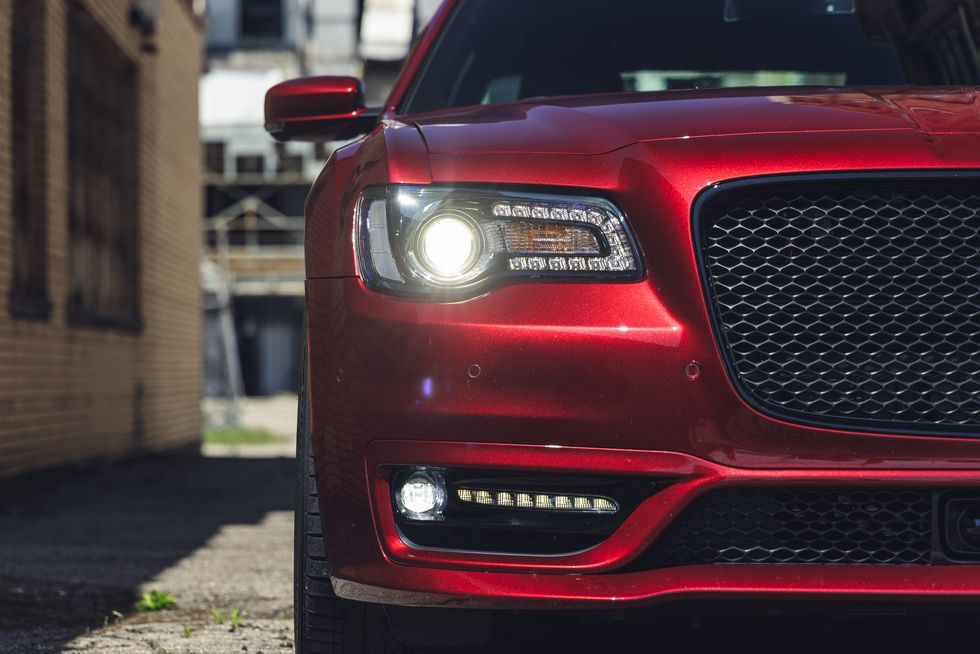From the July/August 2023 issue of Car and Driver.
Farewell tours are gold mines. Nearly every part of the Chrysler 300C is a decade old or more, but before the 300 goes away for good, parent company Stellantis is putting it all back out there for one last blowout.
The 1998 Chronos show car gave us a very early preview, but a more production-ready concept, badged 300C, appeared in 2003. When the first generation went on sale in early 2004, Ralph Gilles’s styling efforts gave this long, low sedan so much presence that many folks likened it to a baby Bentley. It rode atop Chrysler’s LX platform, which cribbed a lot from then-partner Mercedes-Benz. The 300’s lower trims came with a 2.7- or 3.5-liter V-6, the 300C picked up a 340-hp 5.7-liter V-8, and the range-topping SRT-8 that arrived the following year packed a 425-hp 6.1-liter Hemi. The 300’s styling, interior comfort, and driving dynamics earned it 10Best honors in 2005 and 2006.
The second generation of the 300 debuted in 2011, with smoothed-over, if less distinctive, aesthetics. The 3.6-liter V-6 became the base six-cylinder, with higher trims offering either a 5.7-liter or, come 2012, a 6.4-liter V-8. A mild facelift arrived for the 2015 model year, with new safety tech, better infotainment, and an eight-speed automatic, while the SRT was dropped.
And then it sat—until now.
The 6.4-liter returns to the 300C in a limited run of just 2000 units in the United States and 200 in Canada. The model’s V-8 is shared with other Mopar performance nameplates and produces 485 horsepower and 475 pound-feet of torque, all of which is shipped rearward via an eight-speed automatic.
The C stands apart from the pack with a specific tricolor badge, 20-inch wheels wrapped in all-season tires, black exhaust tips, and a lot of dark-chrome accents across the body. Red four-piston Brembo calipers squeeze 14.2-inch front and 13.8-inch rear rotors, while a limited-slip rear differential with a 3.09:1 final-drive ratio helps manage (or overwhelm) traction out back. Inside are black Laguna leather seats with embossed logos up front, silver stitching, an odd smattering of carbon fiber, and a 19-speaker Harman/Kardon audio system.
The two most character-defining parts of the 300C are the 3.09:1 rear end and the all-season tires. Managing all that twist is definitely too much to ask of the 245/45ZR-20 Goodyear Eagle RS-A2s. Even on dry pavement, light throttle application delivers a wallop of torque and wheelspin that the traction control lets fly for a bit before shutting it down. The same goes for the stability control, which is as overworked as a Dickensian school-age coal miner and will happily let the tail out for a few seconds at a time.
The 300C isn’t breaking records, but it still provides plenty of entertainment, reaching 60 mph in 4.4 seconds and crossing the quarter-mile in 12.8 seconds at 114 mph. The all-seasons didn’t help on the skidpad, where we recorded an easily achieved 0.87 g with hints of understeer; some family sedans can push into the 0.90-g range these days.
Chrysler unlocked a couple of unique achievements with the 300C. At wide-open throttle, we recorded 88 decibels, an absolute roar that tops even the Lamborghini Urus Performante. And this long, angry barge is also the only car in recent memory that can use every bit of its 160-mph speedometer.
There is no better way to go out than in a tire-roasting blaze of glory, and the 2023 Chrysler 300C does exactly that. This car is a rubber-melting, hard-charging, and sharp-barking piece of tried-and-true Detroit attitude. As Stellantis embraces its electric future, the 300C will remain on our minds for a long, long time.
What the Hellcat?
We’ve always wondered why Chrysler never went full bat-guano and threw Dodge’s Hellcat supercharged 6.2-liter V-8 under the 300’s hood. “The Hellcat simply doesn’t fit Chrysler brand positioning,” a rep for Chrysler told us. “Chrysler is not the extreme performance brand. A refined combination of power and luxury is the heart of the 300’s soul.” Thankfully, that hasn’t stopped owners from making it happen. Since the LX platform supports the Challenger, the Charger, and the 300, the powertrain components are an easy swap.
Specifications
Specifications
2023 Chrysler 300C
Vehicle Type: front-engine, rear-wheel-drive, 5-passenger, 4-door sedan
PRICE
Base/As Tested: $56,595/$56,595
ENGINE
pushrod 16-valve V-8, iron block and aluminum head, port fuel injection
Displacement: 392 in3, 6417 cm3
Power: 485 hp @ 6100 rpm
Torque: 475 lb-ft @ 4100 rpm
TRANSMISSION
8-speed automatic
CHASSIS
Suspension, F/R: control arms/multilink
Brakes, F/R: 14.2-in vented disc/13.8-in vented disc
Tires: Goodyear Eagle RS-A2
245/45ZR-20 99Y M+S
DIMENSIONS
Wheelbase: 120.0 in
Length: 198.6 in
Width: 74.9 in
Height: 58.7 in
Passenger Volume, F/R: 56/51 ft3
Trunk Volume: 16 ft3
Curb Weight: 4467 lb
C/D TEST RESULTS
60 mph: 4.4 sec
100 mph: 9.8 sec
1/4-Mile: 12.8 sec @ 114 mph
130 mph: 17.1 sec
150 mph: 25.7 sec
Results above omit 1-ft rollout of 0.3 sec.
Rolling Start, 5–60 mph: 4.9 sec
Top Gear, 30–50 mph: 2.3 sec
Top Gear, 50–70 mph: 2.8 sec
Top Speed (mfr’s claim): 160 mph
Braking, 70–0 mph: 172 ft
Braking, 100–0 mph: 342 ft
Roadholding, 300-ft Skidpad: 0.87 g
C/D FUEL ECONOMY
Observed: 18 mpg
75-mph Highway Driving: 22 mpg
75-mph Highway Range: 400 mi
EPA FUEL ECONOMY
Combined/City/Highway: 18/15/24 mpg
Senior Editor
Cars are Andrew Krok’s jam, along with boysenberry. After graduating with a degree in English from the University of Illinois at Urbana-Champaign in 2009, Andrew cut his teeth writing freelance magazine features, and now he has a decade of full-time review experience under his belt. A Chicagoan by birth, he has been a Detroit resident since 2015. Maybe one day he’ll do something about that half-finished engineering degree.

